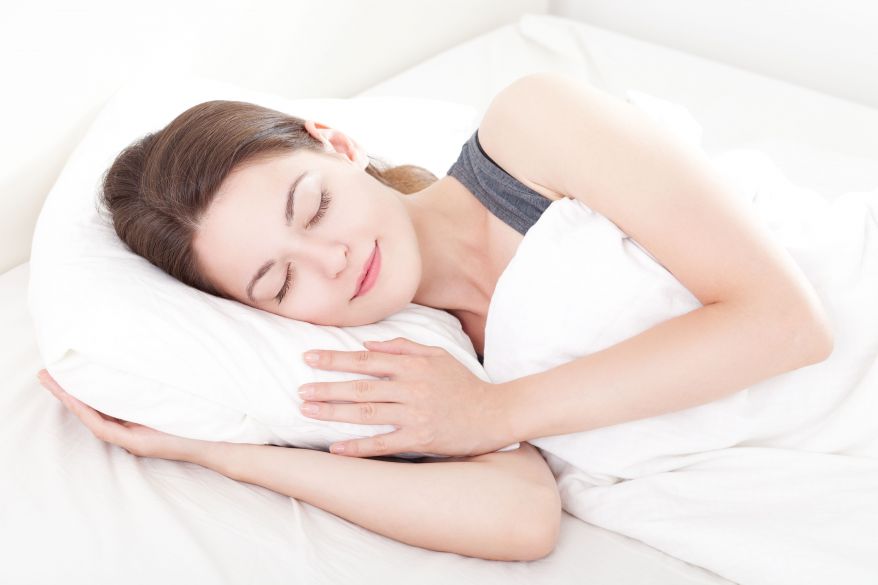While you may think that the only thing that is needed for you to sleep at night is to feel tired, you should know that the design of your bedroom plays a huge role in the quality of sleep that you receive.
Many people do not consider the design of their bedrooms unless they suffer from sleeplessness on a regular basis.
However, if you find yourself waking up tired in the morning, your bedroom could actually be to blame. Here are six tips for creating a better sleep environment in your home so that you can enjoy more restful sleep.
1. Find the right bed

A bed that is too soft or too firm can make it difficult for you to fall asleep at nighttime. You should also make sure that you change your mattress roughly every 7-8 years so that you can be assured that the mattress is providing the support that you need. Invest in quality bedding that is comfortable and will keep your body temperature at normal levels during sleep.
2. Adjust the room temperature
If you have trouble sleeping, it may be because the temperature in your bedroom is too hot or too cold. A bedroom temperature of 20-25 Celsius is a good range to keep for your bedroom to ensure that you are comfortable while you sleep. Many people find that they sleep best at specific temperatures. So get to know your preferred temperature range with some testing.
3. Get Rid of the distractions
Having distractions in your room such as clutter or electronics can prevent you from sleeping well. When it is time to go to sleep, the design of your bedroom should ensure that sleeping is the only thing that there is to focus on. It may help to take out the TV, computer, or smartphone that keeps you up at night when you should be sleeping.
4. Reduce noise and try white noises
Unexpected or annoying sounds at nighttime, such as a barking dog or clanking pipes can keep you from sleeping. Studies have found that some people have trouble falling asleep if they don't have familiar nighttime noises. If you prefer noise at night, try sleep audio tracks or a white noise machine to help create sounds in your bedroom that will help you fall asleep.
Personally, I use my Google Assistant to play Nature or Rain background noises to relax and feel I am in the forest apart from civilization.
5. Fix the lighting
Light exposure from electronics has been proven to disrupt rest patterns. To get better sleep, make sure that the screens from these devices are off. If light from the outside is bothering you, invest in some better shades or blinds to keep your room dark while you sleep. Curtains can also help prevent light from leaking into the room through the shades. If you are very light-sensitive, a sleep mask can help you to keep out any light so that you will have complete darkness as you try to fall asleep.
6. Use the right pillows
If your body isn't adequately supported by the pillows that you sleep on, you may find that you often wake up with neck or back pain. Pillows are important for making sure that your blood flow isn't restricted as you rest and that you are breathing freely. If you are not sure which pillows are the best options for your needs, the experts at Therapeutic Pillow can help you to select the right pillows and cushions. We make pillows for specific conditions and consumers of all ages who need better support at nighttime.
If you are still having trouble sleeping, it might be a good idea to discuss your concerns with a doctor to get professional medical advice diagnosis or treatment. He or she may recommend a prescription rest aid or other remedy to help you with your sleep problems. Learning how to sleep better is all about making your bedroom the ideal place to rest. Therefore, don’t discount the importance of a good bedroom setup with quality pillows if you want a better night’s rest.
If you are interested in learning more about how to improve your sleep, and what our pillows and cushions can do to help you rest better, contact Therapeutic Pillow at (03) 8585-6685.
Do you want to learn more? Read our Frequently Asked Questions for...
Breaking bad sleep habits can be challenging, but with some simple changes, you can improve your sleep routine. Firstly, it's important to establish a consistent sleep schedule. Try to go to bed and wake up at the same time every day, even on weekends. This helps regulate your body's internal clock and promotes better sleep. Secondly, create a relaxing bedtime routine. Engage in activities that help you unwind, such as reading a book or taking a warm bath. Avoid stimulating activities like using electronic devices or watching TV before bed, as they can interfere with your sleep. Additionally, make your bedroom a sleep-friendly environment by keeping it cool, dark, and quiet. Investing in a comfortable mattress and pillows can also enhance your sleep quality. Lastly, limit caffeine and alcohol intake, especially close to bedtime, as they can disrupt your sleep patterns. By implementing these changes and being consistent, you can gradually break bad sleep habits and improve your overall sleep quality.
Remember, breaking bad sleep habits takes time and patience. It's important to be consistent with your new sleep routine and give your body time to adjust. If you continue to struggle with sleep, it may be helpful to consult a healthcare professional for further guidance and support.
 0
0 0
0To increase the time you spend in bed, there are a few simple steps you can take. Firstly, establish a consistent sleep schedule by going to bed and waking up at the same time every day, even on weekends. This helps regulate your body's internal clock and promotes better sleep. Secondly, create a relaxing bedtime routine that signals to your body it's time to wind down. This could include activities like reading a book, taking a warm bath, or practicing relaxation techniques such as deep breathing or meditation. Additionally, ensure your sleep environment is comfortable and conducive to restful sleep. Keep your bedroom cool, dark, and quiet, and invest in a supportive mattress and pillows. Lastly, avoid stimulating activities and substances close to bedtime, such as caffeine, nicotine, and electronic devices, as they can interfere with your ability to fall asleep and stay asleep. By implementing these strategies, you can increase the time you spend in bed and improve the quality of your sleep.
 0
0 0
0Whether it's better to sleep in or wake up early depends on individual lifestyle, preferences, and sleep needs. Waking up early can provide more time for productivity and establishing a consistent routine, which may have positive impacts on mental and physical well-being. It's linked to improved mood and enhanced focus. On the other hand, getting sufficient sleep by sleeping in can aid in overall rest and recovery, benefiting cognitive function and stress reduction. The key lies in maintaining a regular sleep schedule and ensuring you're getting the recommended amount of sleep for your age group, typically 7-9 hours for adults. It's essential to align your sleep patterns with your daily activities to strike the right balance between waking up early and allowing your body to rest adequately.
 0
0 0
0
Sleeping without a pillow is a personal preference and can vary based on individual comfort and sleeping habits. While some people find it beneficial for their neck and spine alignment, others might experience discomfort or strain. Pillows often provide support to maintain a more neutral sleeping posture and can be especially helpful for those with certain conditions like neck pain or sleep apnea. It's recommended to try both options and listen to your body to determine what offers you the most restful and comfortable sleep.
 0
0 0
0The average time spent in bed varies from person to person. It depends on individual factors such as age, lifestyle, and personal preferences. Generally, adults tend to spend around 7 to 9 hours in bed each night to ensure they get enough restorative sleep. However, some people may require more or less time in bed to feel fully rested and refreshed. It's important to listen to your body and establish a sleep routine that works best for you, allowing you to wake up feeling energized and ready for the day ahead.
Factors like work schedules, stress levels, and sleep disorders can also affect the amount of time individuals spend in bed. It's crucial to prioritize quality sleep rather than solely focusing on the number of hours spent in bed. Creating a comfortable sleep environment, practising good sleep hygiene, and adopting relaxation techniques can all contribute to a better night's sleep. Remember, everyone's sleep needs are unique, so finding the right balance of time in bed is essential for your overall well-being.
 1
1 0
0







